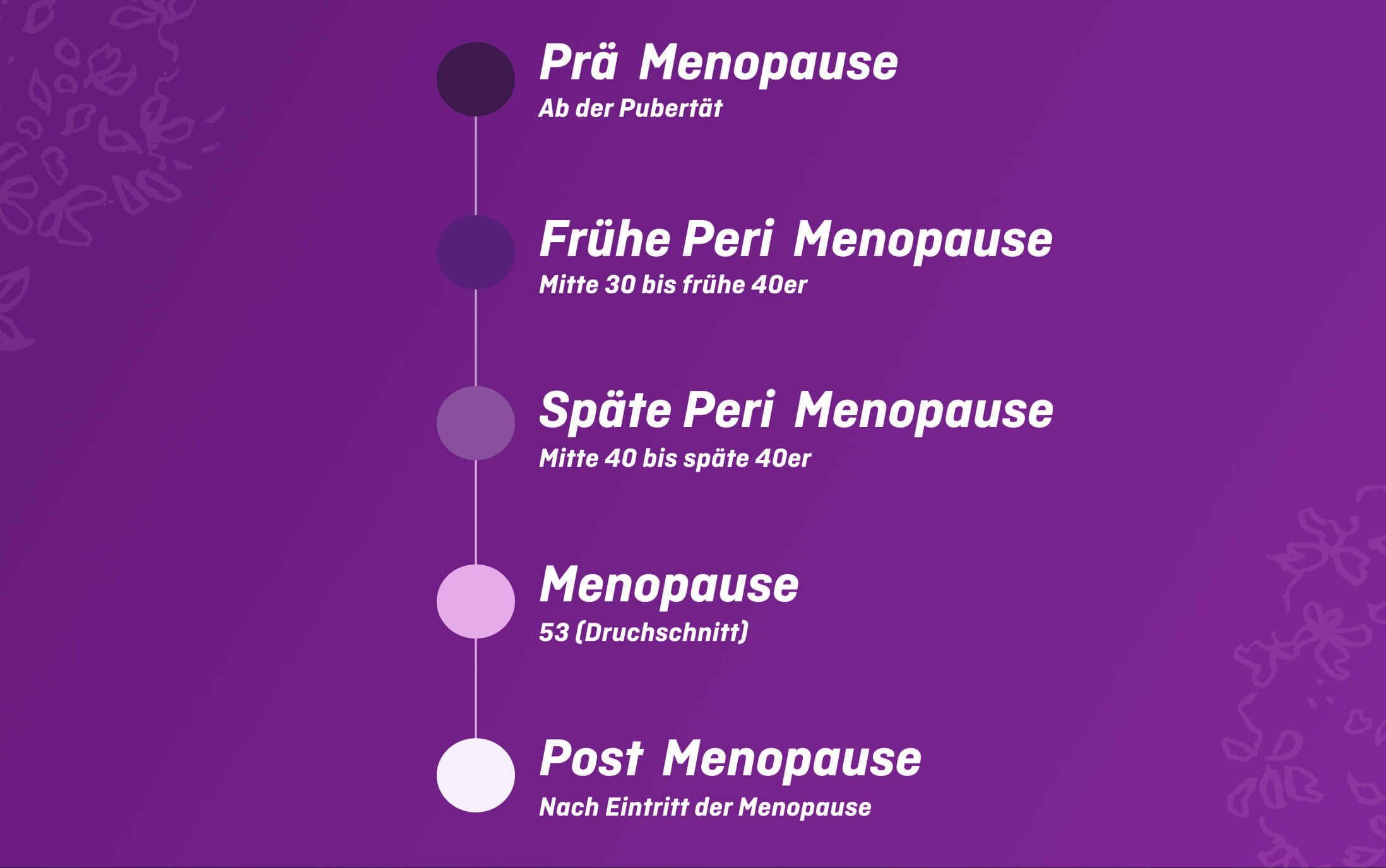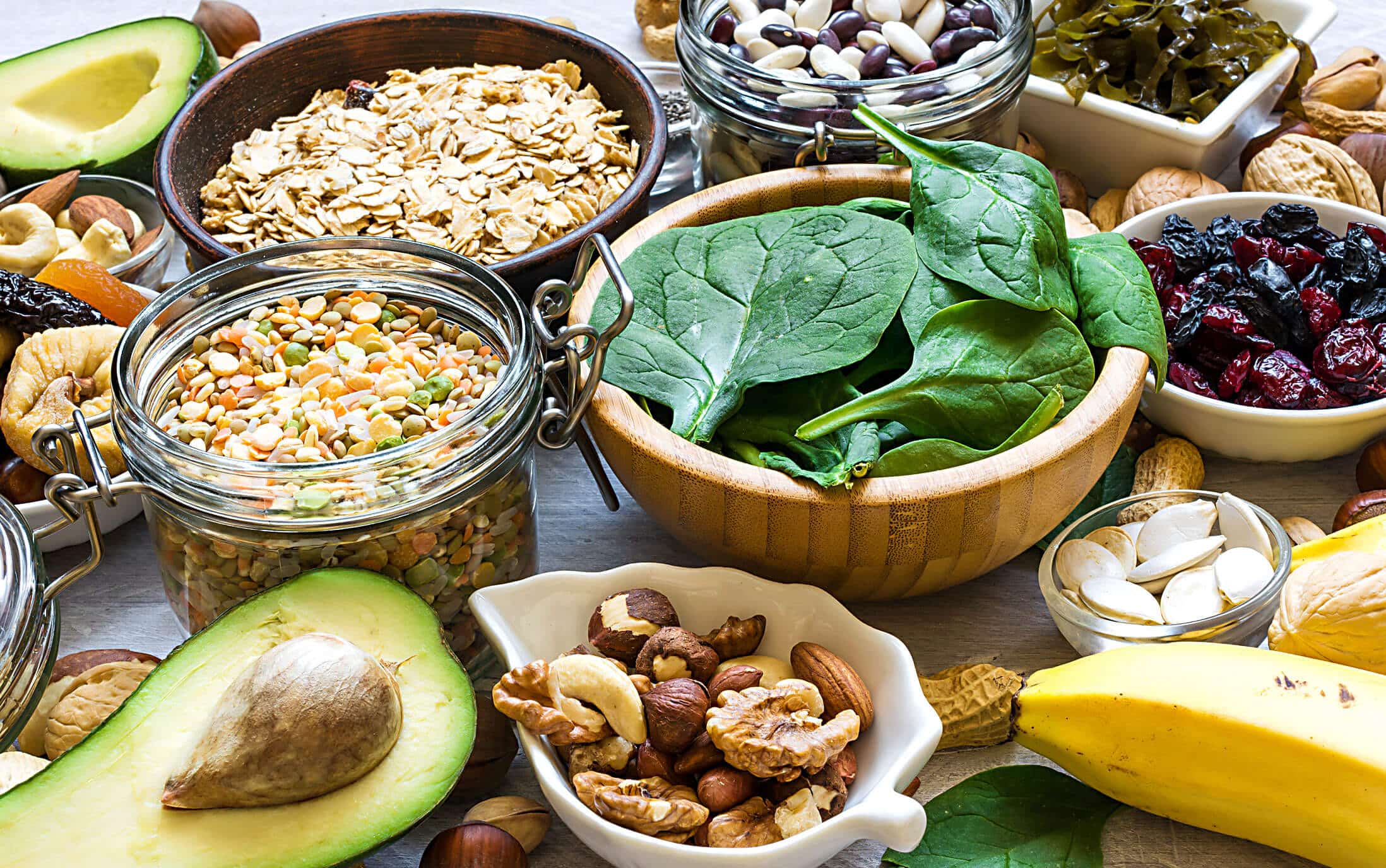Rheumatic complaints during the menopause
Your fingers feel stiff, your shoulders hurt, your legs are swollen and your muscles feel painful. These menopausal complaints are especially unpleasant as they restrict mobility and flexibility and make you feel as if you have aged years. The following article will tell you what can cause rheumatic complaints during the menopause and what you can do about them.
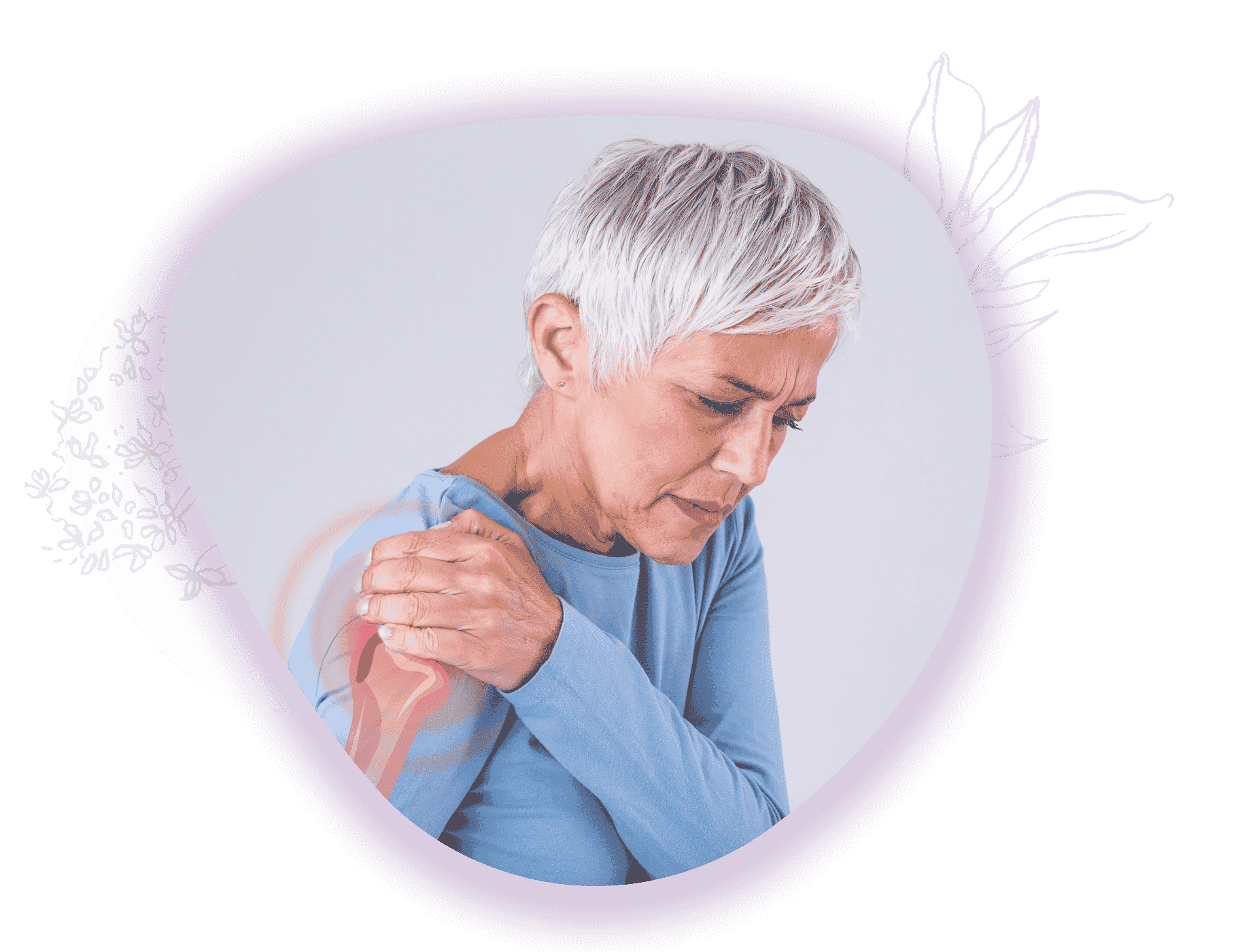
Rheumatic complaints during the menopause: Signs and symptoms
Acute and chronic illnesses of the mobility apparatus with painful muscles and joints are some of the most frequent diagnoses. Among rheumatic complaints, traditionally known as rheumatism, these two different forms occur often:
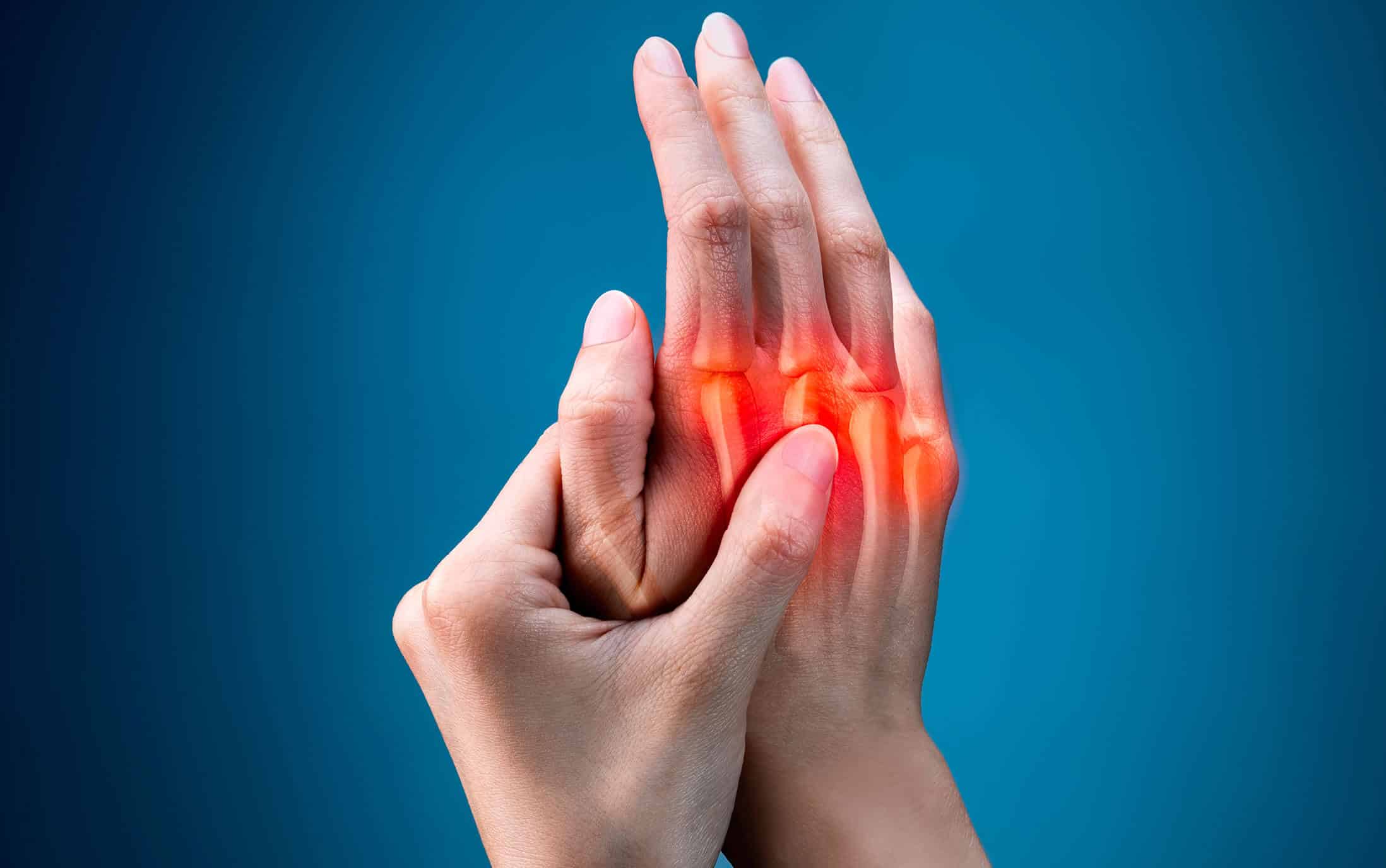
The joints can swell up and feel as if they’re becoming stiffer and stiffer; during the morning, this feeling of stiffness is particularly pronounced. This mainly affects the shoulders, neck, fingers, knees, hips and wrists. These sometimes painful complaints not only have a negative impact on well-being, but they can also restrict flexibility and mobility. Nevertheless, it is important to exercise and not assume any restrictive posture, so that the complaints do not worsen and become chronic.
Arthrosis: An arthrosis is the result of joint wear and usually occurs with increasing age. Pain in the knees, hips or ankles are characteristic.
Arthritis: Inflammatory processes are responsible for arthritis. These joint diseases are usually expressed in the joints of the fingers, hands or toes.
Rheumatic complaints during the menopause – What you need to know
Almost one in two women suffer from joint and muscle pain during the menopause. These not only occur in the morning or in certain situations, but can also extend throughout the whole day. They have one thing in common: They impede movement, meaning that those affected can suddenly feel as if they have aged years. It is important to know that you are not alone.
During the menopause, the following are particularly susceptible to muscle and joint pain: Shoulders, neck, back, fingers and hands, hips and knees
Almost half of all menopausal women suffer from muscle and joint pain. Scientists now assume that the falling production of oestrogen is responsible for rheumatic complaints during the menopause.
The natural medicinal herb extract EstroG-100® alleviates numerous discomforts during the menopause and is highly effective against rheumatic complaints. Clinical studies have shown a significant reduction in the occurrence of muscle and joint pain of around 65%.
Oestrogen helps with the formation of joint fluid and the care of cartilage.
Oestrogen also stimulates the build-up of collagen in the body, which is not only a key component of the skin, but also of tendons and ligaments. The joint structures become harder due to the reduced production of oestrogen and collagen.
Oestrogen has a protective function in the body and inhibits inflammations so that the increasing lack of oestrogen facilitates the creation of inflammatory processes in the joints.
Oestrogen promotes the release of endorphins. These endemic neurotransmitters have a euphorigenic effect and suppress physical pain. If the oestrogen level falls, the pain limit falls, causing the pain sensation to increase.
At the same time, do not forget that as you get older, the likelihood of developing osteoporosis, arthrosis or arthritis increases.
Rheumatic complaints during the menopause: Prevention and treatment
If the muscle and joint pains continue and are impairing your well-being and quality of life, then you should do something.
Omega 3 fatty acids are not only recommended in cardiac medicine, but also for the treatment of joint pain.
Glucosamine combined with chondroitin also support joint build-up, with their effect further increased by taking omega 3 fatty acids. These are polyunsaturated, essential fatty acids that are part of the cell membranes. Omega 3 fatty acids are also the starting substance for the formation of tissue hormones and have a positive effect on inflammations, blood thinning, blood pressure, immune defence and the fat and protein metabolism.
The key sources of Omega 3 are vegetable oils, particularly linseed oil and walnut oil. Omega 3 fatty acids are also found in fatty fishes, such as salmon, mackerel, herring and sardines. The ratio of Omega 3 to Omega 6 fatty acids is important. According to information from the German Society for Food, this should lie at 5:1. The proportion of Omega 3 fatty acids has to significantly exceed that of Omega 6 fatty acids, with the proportion of Omega 6 fatty acids overbalanced in most people due to diet.
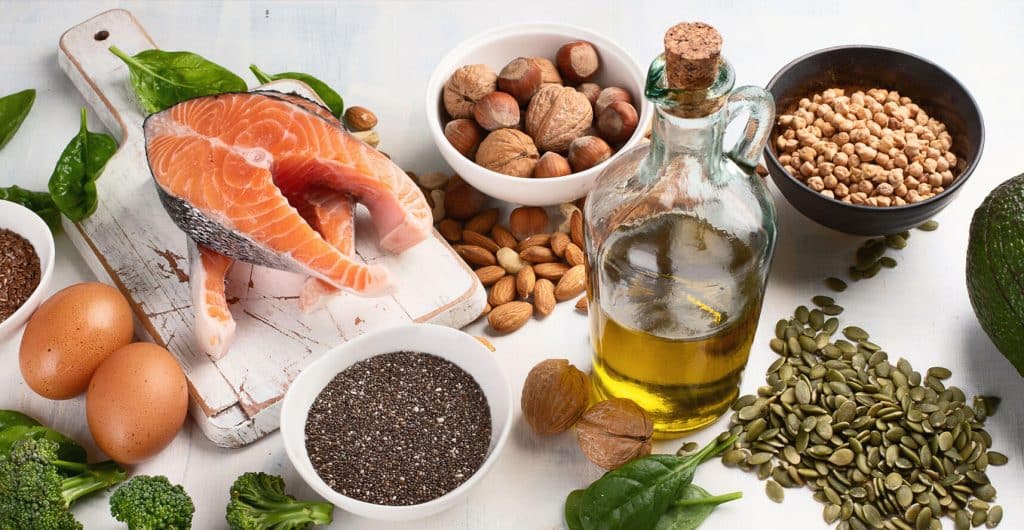
Our tips for you:
Muscle and joint pain during the menopause can be resolved naturally in many cases, including with these measures:
Pay attention to diet: Avoid overacidification and follow a diet that keeps the acid/base ratio balanced. Prepare your own meals and avoid fast food and ready-made meals. Enjoy a vitamin-rich diet with lots of herbs and spices which are rich in pain-relieving substances, such as black pepper, turmeric and ginger.
Avoid inflammation-promoting foods: It is recommended that you reduce animal fats and animal products. This mainly applies for red meat and sausage, which are both rich in arachidonic acid and facilitate joint inflammations.
Opt for inflammation-inhibiting foods: Vice versa, you should opt for foods that inhibit inflammation. Along with fatty fish, linseed oil and walnut oil are rich in inflammation-inhibiting Omega 3 fatty acids. The second component is vegetables and fruit, which contain anti-oxidants and secondary ingredients. Blueberries (as well as other berries), red pepper and cabbages like broccoli are especially recommended.
Physiotherapy and acupuncture: If you often suffer from pain, particularly in large joints such as the shoulders, hips and knees, you can try to relieve these using physiotherapy and acupuncture.
Self-massage with medicinal herb oils: For pain in small joints, self-massage with peppermint oil, which has a cooling effect, or with rosemary oil that stimulates circulation, can help.
Joints need exercise: Exercise sufficiently supplies the bones, cartilage and connective tissue with nutrients and causes joint fluid to be exchanged. Due to the pulling and pushing forces on your joints, not only is the supply of nutrients improved, but the joints become more elastic. Do something that you enjoy and which does not put strain the joints, such as going for a stroll, walk, hike, cycling, swimming, yoga, pilates, callanetics, Qi Gong or Tai Chi. Support the muscles and stabilise the tissues, which is why strength training is also recommended.
menoelle® and rheumatic complaints
Thanks to their holistic mode of action, menoelle® tablets are the means of choice for the effective, hormone-free and well-tolerated alleviation of menopausal symptoms, particularly if a classic or herbal hormone therapy is not possible or desired.
menoelle® tablets are also a reasonable alternative if other products are not effective enough or cannot be considered due to their risk of side effects or their restrictions of use.
Stockists
menoelle® menopause tablets can be purchased in dm, Rossmann, Müller, BUDNI and Globus branches.
menoelle® menopause tablets can also be purchased online at menoelle, aponow, dm, Rossmann, Müller, Amazon.
Cue: Visit the doctor
Muscle and joint pain caused by the menopause are nothing out of the ordinary and are not cause for concern. Nevertheless, you do not have to suffer this pain in silence, but can deal with it together with your doctor.
If you have not had problems with your joints until now, then it is likely that your joint pains are actually menopause-related. Only a precise medical examination can provide information on the actual cause. Therefore, have your symptoms clarified medically to discover the precise cause and to rule out other diseases such as arthrosis, rheumatoid arthritis or gout.

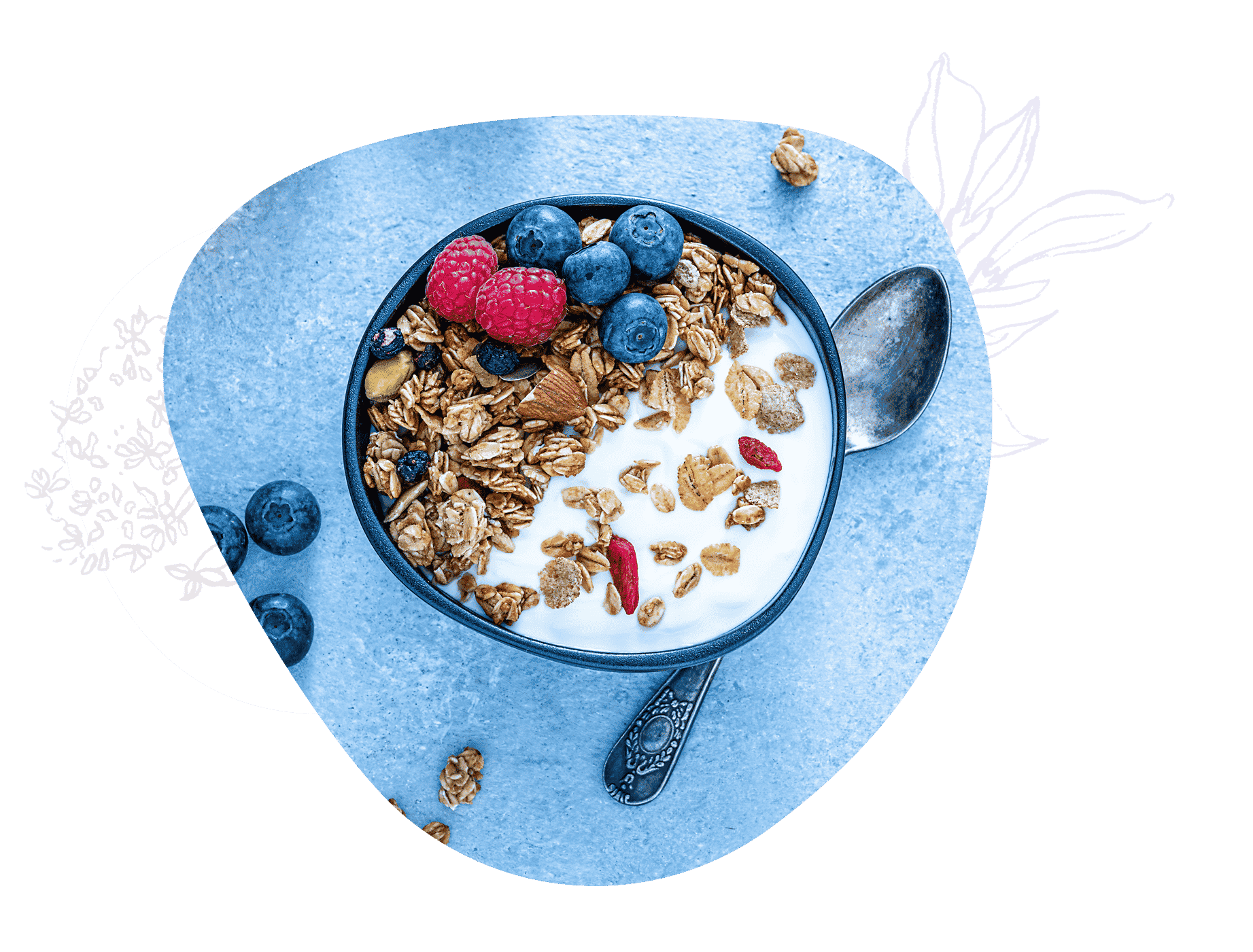
Rheumabowl for breakfast
Make an – every day at best – inflammation-inhibiting breakfast with low-fat quark, alternatively with skyr, plain yoghurt or vegan coconut yoghurt.
Stir in a shot of linseed oil. Add plenty of blueberries or other berries as well as a handful of walnut kernels. If you do not like the natural taste of linseed oil, you can add a few mint leaves.
Menotest
menoelle®-menopause test
Am I already in the menopause or not yet?
Simply answer the 20 short questions in our menoelle® menopause test to know more straight away.

